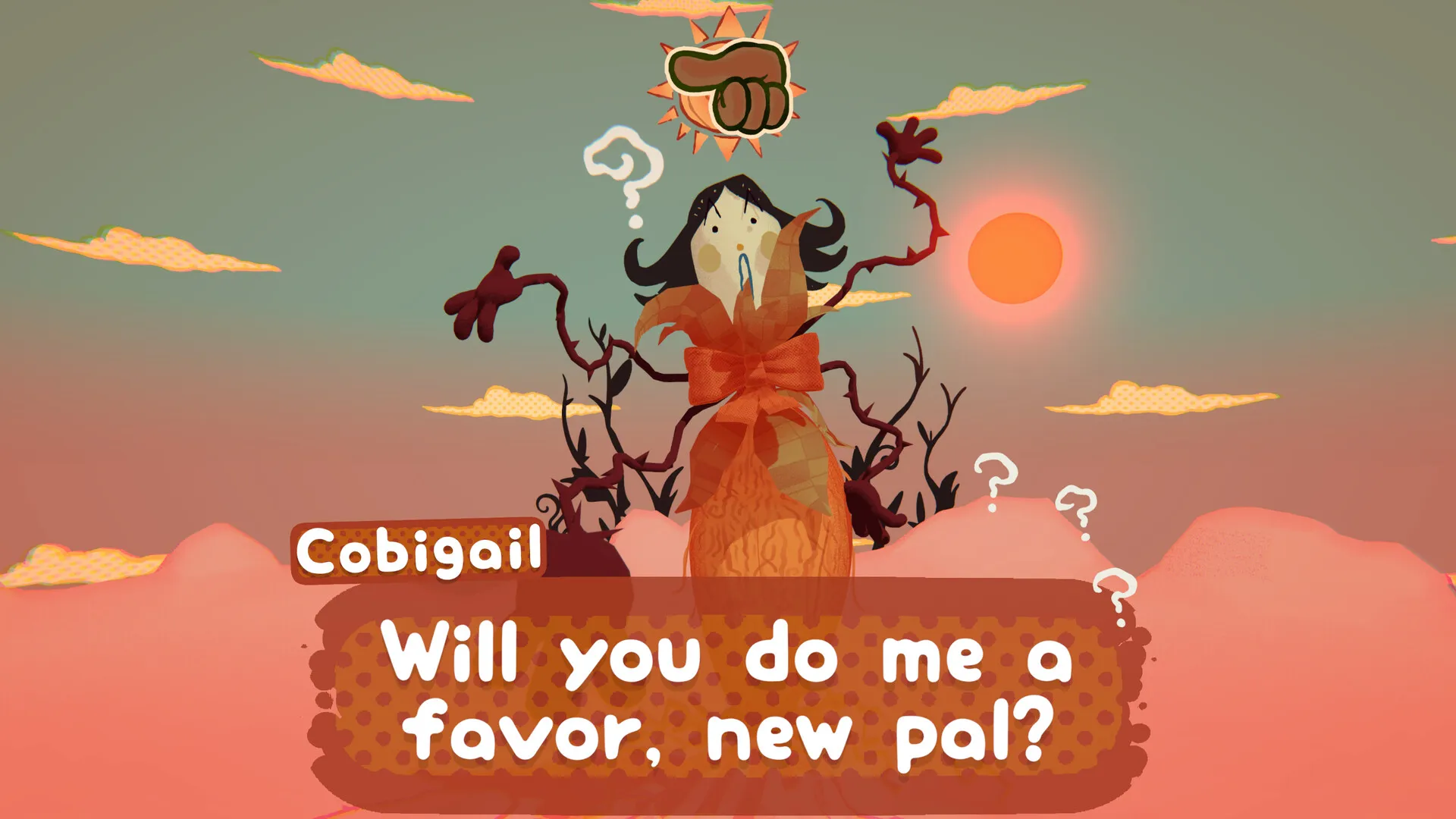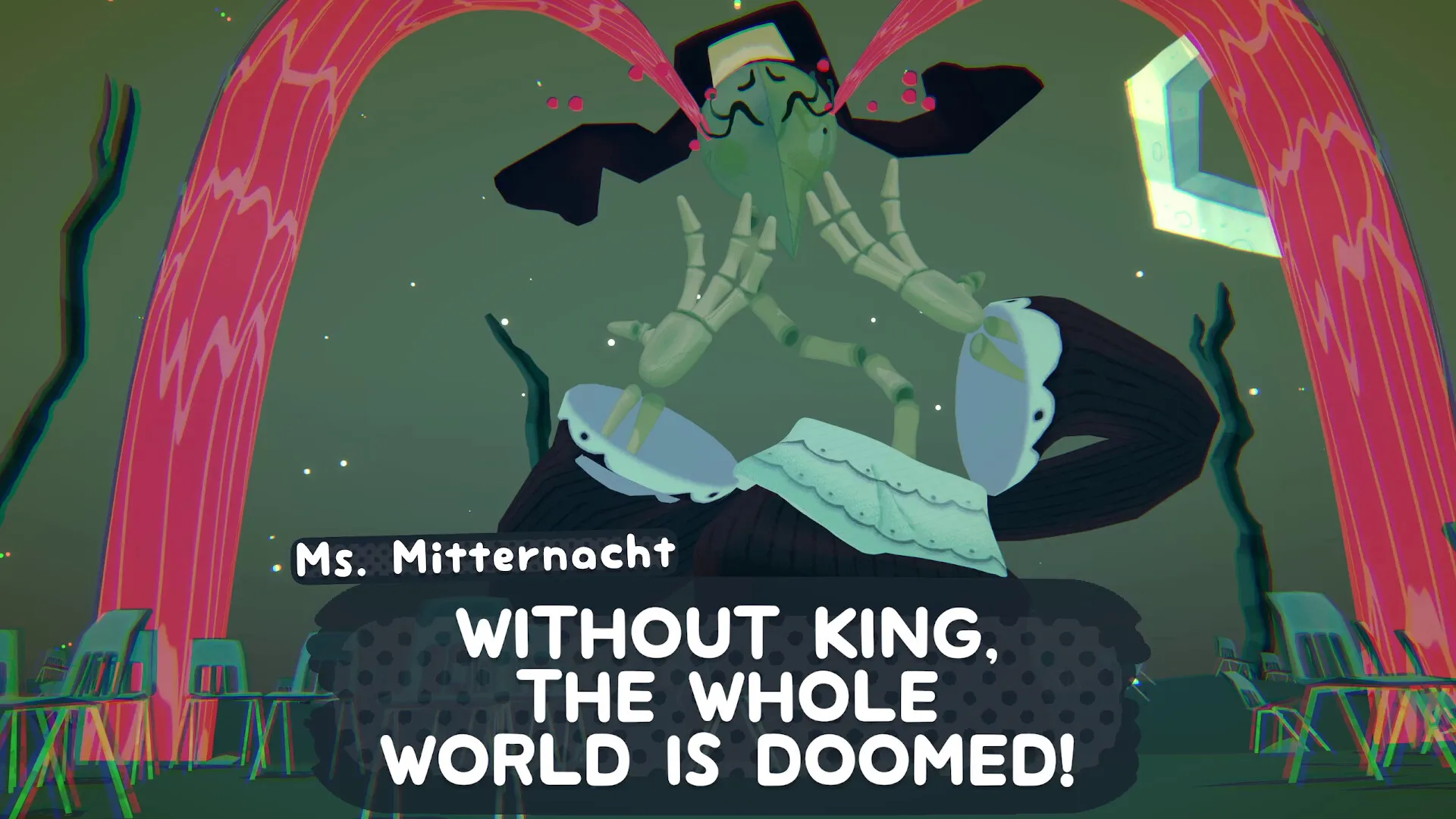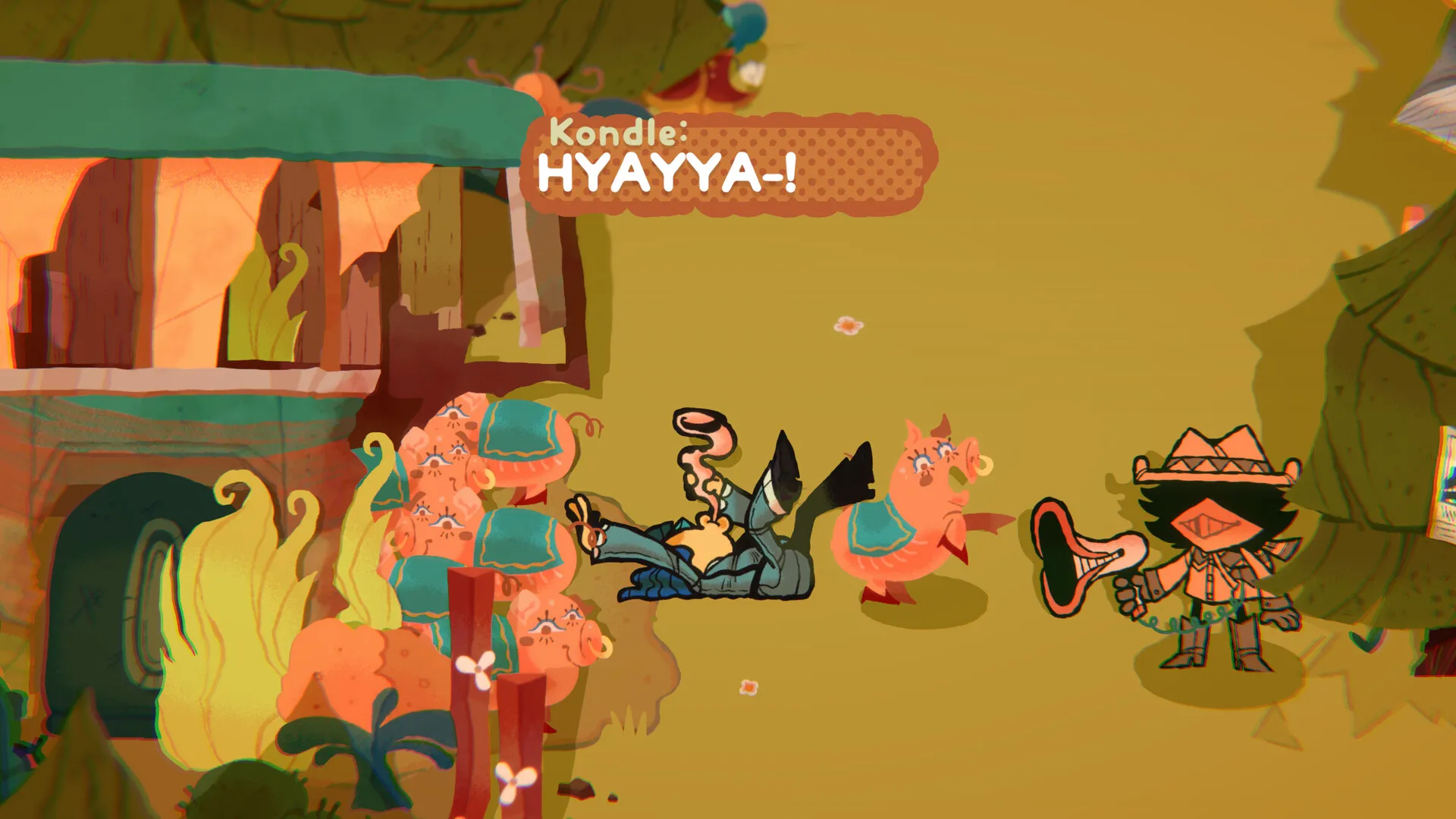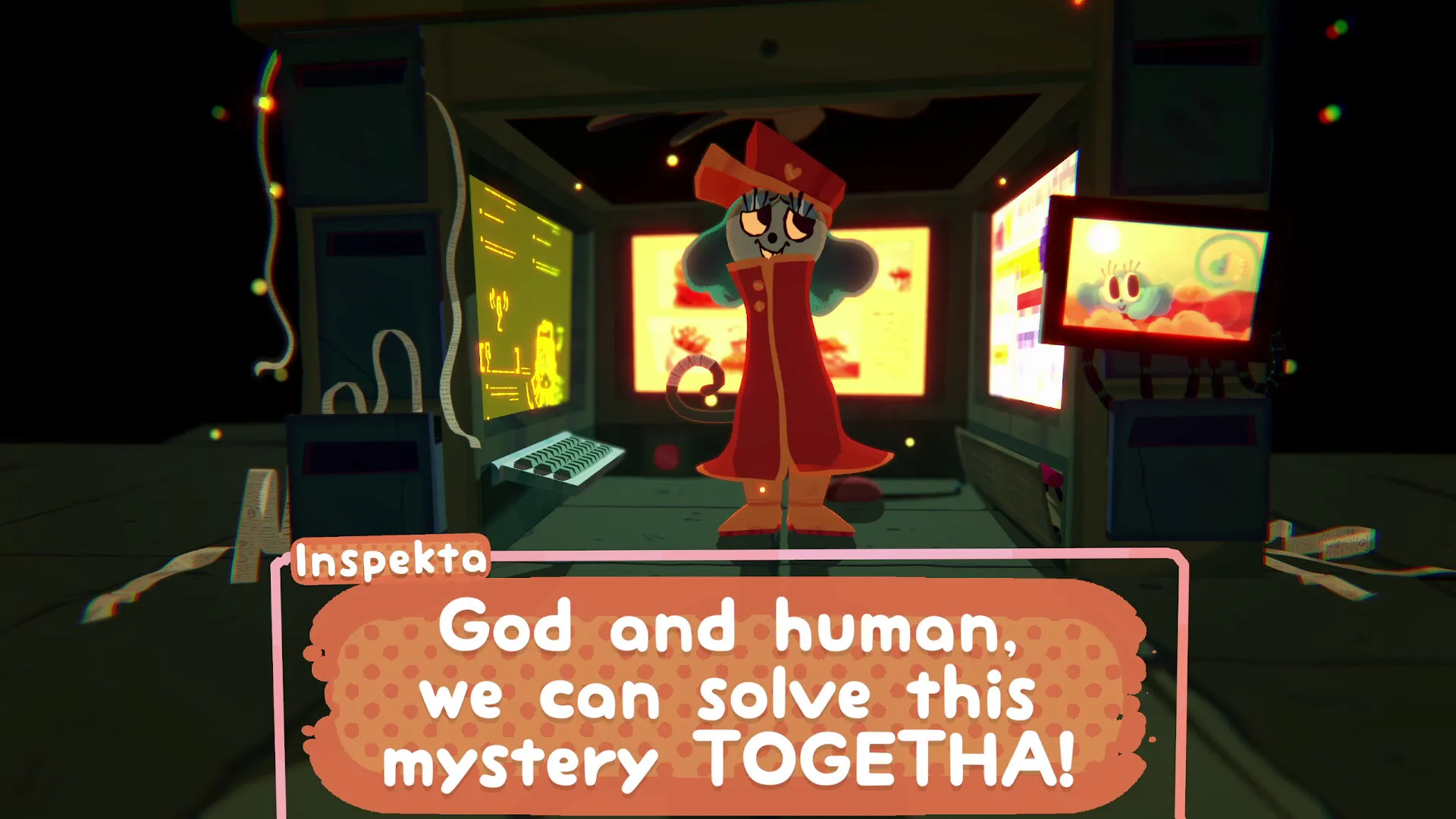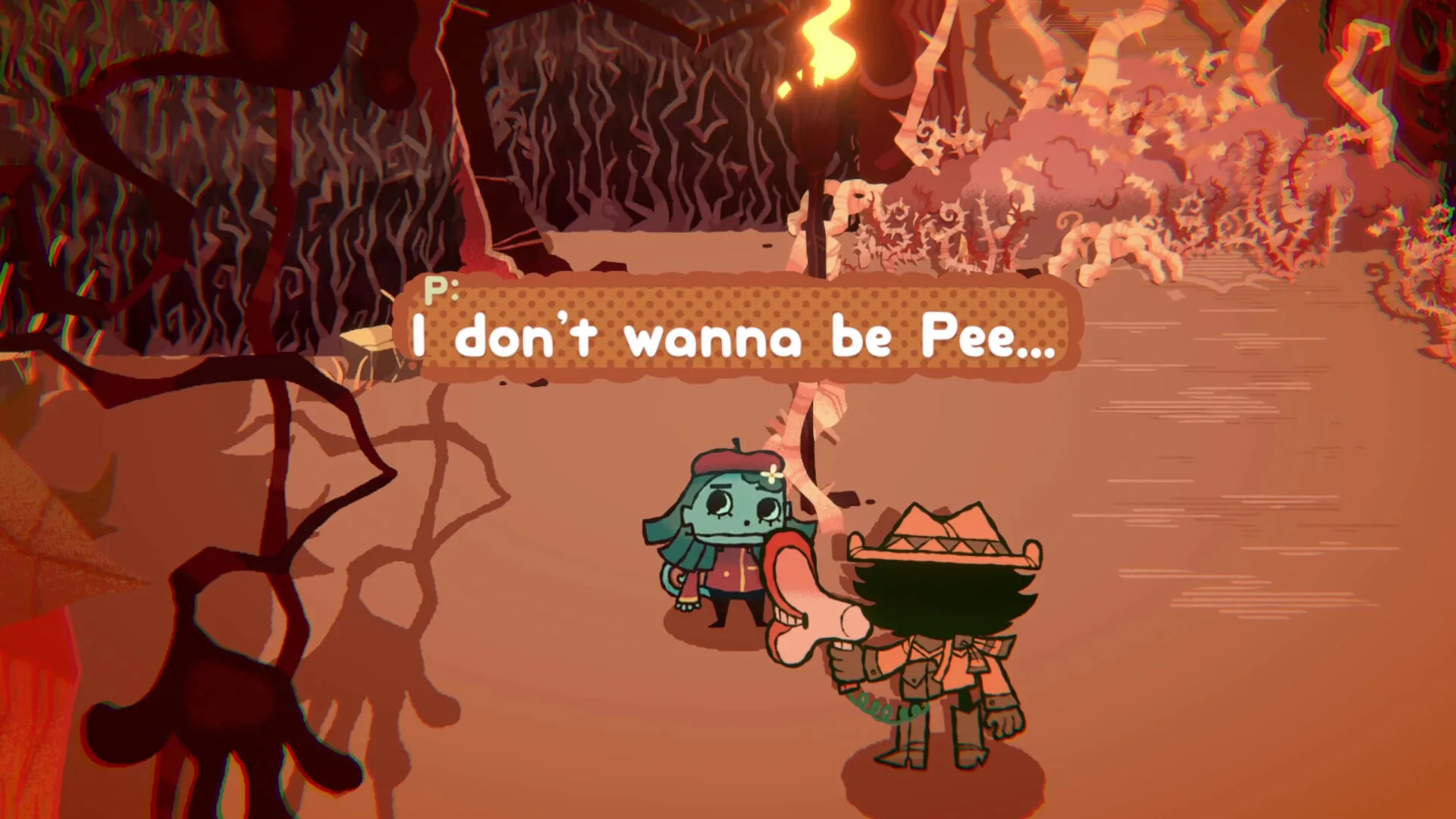The Megapon, a one-of-a-kind tool that works as a vacuum and a cannon for words, is one of the most striking features of Great God Grove. This unusual gadget serves as the gameplay’s backbone, allowing players to “suck up” sentences, phrases, or objects from conversations and environments and then “fire” them back at characters or puzzles to advance.
The Megapon’s mechanics are simple yet clever: players can save up to five dialogue pieces simultaneously, creating a dynamic stockpile of words that serve as puzzle-solving resources. For example, one early puzzle involves “Open your eyes!” to wake up a character. At the same time, another assignment demands a dog’s “ruff-ruff” to unsettle a character preoccupied with smoothness. These interactions stimulate experimentation and reward players for thinking creatively within the game’s strange logic.
The Megapon’s mechanics are undeniably unique. Few games in the adventure-puzzle genre have used language as a physical gameplay element. While it shares DNA with traditional point-and-click games like The Secret of Monkey Island, where witty dialogue is frequently required for development, Great God Grove makes words a physical resource.
This feature encourages participation because players actively manipulate language to impact results rather than passively selecting dialogue alternatives. The system’s ridiculousness, which is evocative of games like Katamari Damacy and Papers, Please, adds a layer of humor and unpredictability to the experience.
However, the execution isn’t flawless. Players must carefully sift conversations for essential phrases due to lacking a quest marker or hint layer, which can lead to tedious bouts of trial and error. Similarly, some puzzles feel overly obscure, such as the aforementioned “ruff-ruff” example, in which the solution is based on a character’s insecurities rather than any obvious game logic.
This can occasionally disrupt normally seamless gameplay, leaving players scrambling for the appropriate combination of words. Despite these shortcomings, the Megapon’s novel design keeps it a distinctive mechanic, offering a unique take on narrative-driven puzzle-solving that is rarely seen in the genre.
The Story of Great God Grove: Narrative Analysis
At its foundation, Great God Grove provides a playful yet unexpectedly poignant narrative about the power—and danger—of communication. Set in a world on the verge of disaster, the story begins with the mysterious departure of King, the God of Communication, who has caused turmoil among gods and mortals.
King creates a trail of incendiary letters that aggravate tensions, creating a fragmented society in which divine squabbles threaten to unravel reality. This catastrophic setting contrasts with the game’s humorous, joyful tone, as the player, known as “Godpoke,” enters with the mission of restoring unity. Armed with the Megapon, players must settle conflicts, discover the King’s objectives, and restore peace to the Grove before tragedy hits.
A cast of odd but fascinating characters populates the narrative, each contributing to the greater themes of communication and character. Inspekta, the God of Leadership, is a notable character who serves as a guide and comic relief. His “Bizzy Boys,” naughty puppet-like subordinates, bring lightness to the story with their wild energy and amusing puppet displays that serve as both exposition and amusement. Meanwhile, King maintains an enigmatic presence throughout the game, his invisible but keenly felt influence fueling most of the conflict. The gods that players encounter, such as Cobigail, the God of the Harvest, and the feuding writer/editor combination in HobbyHoo, have exaggerated characteristics that underscore the consequences of miscommunication and broken relationships.
Thematically, the game deftly examines the fragility of connection and the unintentional consequences of words. The fundamental mystery—why King undermined the holy community—is laced with intriguing themes about leadership responsibility and the ripple repercussions of bad communication. By making the player an active participant in resolving these problems, Great God Grove supports the idea that unity can only be attained through mutual understanding and collaboration.
Comparisons can be drawn to games like Undertale and Night in the Woods, which approach serious topics with unique characters and humor. While the game’s whimsical tone and fractured narrative structure create moments of brilliance, the broader story sometimes lacks the cohesion and depth required to raise the stakes. Nonetheless, its dedication to investigating the subtleties of communication leaves a lasting effect.
A World of Whimsy: Visual and Audio Design
Great God Grove’s visual design is a notable element, blending 2D and 3D art styles to create a unified and pleasantly bizarre appearance. The game’s world feels like a handcrafted pop-up book full of brilliant colors—vibrant yellows, teals, and oranges dominate the palette, creating a warmth that contrasts with the underlying catastrophic stakes.
Characters are created in a puppet-like cutout approach, lending them a whimsical, exaggerated presence. This design choice works especially well for highlighting the gods’ larger-than-life personas, such as the rustic Cobigail or the theatrical gods of HobbyHoo. The transition between top-down 2.5D exploration and first-person meetings with the gods adds complexity to the visual storytelling, underlining their formidable nature while maintaining the lighthearted tone.
One of the more unique visual components is incorporating live-action puppet shows performed by Inspekta’s “Bizzy Boys.” Styled like classic VHS cassettes, these pieces are as odd as they are funny, adding a layer of mixed-media lunacy reminiscent of Don’t Hug Me I’m Scared. While these puppet moments feel slightly distant from the game’s overall look, they add comic relief and a memorable artistic flare.
The soundtrack design enhances the game’s quirky vibe. Louie Zong’s upbeat soundtrack includes whimsical, genre-hopping compositions ranging from arcade-like jingles to twangy country ballads in Mildred that brilliantly convey the particular mood of each area. Tony “ERGO” McVaney’s sound effects offer comic touches, while the Megapon’s suction and firing noises provide pleasant feedback.
The gibberish voices of characters in Animal Crossing, such as Marsha’s sped-up “booger” babbling, add an appealing touch to the dialogue. However, the gibberish might get annoying over time, particularly during extended conversations. Despite minimal aural fatigue, Great God Grove is an audiovisual experience that lingers long after the credits roll because of the fusion of spectacular sights and whimsical soundscapes.
Navigating the Grove: Game Structure and Pacing
Great God Grove’s framework unfolds across four unique places, each presenting its difficulties, characters, and gods to mediate. While the initial area is a tutorial, the remaining levels display the game’s design and narrative inventiveness. Mildred, for example, stands out with its vibrant sunset colors and a small-town scenario in which disinformation has interrupted harvest rituals, possibly leading to the possibility of human sacrifice.
The level design prioritizes exploration and problem-solving inside small, interconnected regions, giving each area a sense of purpose and cohesion. However, because the game lacks a formal quest system or markers, players must rely on observation and memory to piece together objectives, which can feel invigorating for some but painfully aimless for others.
Progression heavily relies on the Megapon’s mechanics and the player’s ability to understand the game’s unusual logic. While this works effectively in areas like Mildred, where puzzles stack on top of one another to create a gratifying flow, later levels like HobbyHoo feel more dispersed. The introduction of two gods at every level in the second half of the game dilutes the complexity of character interactions and narrative focus, leaving some sections feeling superficial. The lack of a guiding system is particularly obvious in these large areas, where progress frequently devolves into a trial-and-error scavenger quest for the appropriate words or interactions.
The pacing remains a mixed bag throughout. The early sections combine world-building, character development, and puzzle-solving, but the second half falls short. The story’s rising stakes are hampered by repetitious backtracking and fetch-quest-style progression, which can derail momentum. For example, chores like resolving HobbyHoo’s creative quarrel or supporting Mildread’s townspeople can need lengthy travels between characters to unearth particular phrases, stretching out the experience.
While the game’s brief duration (about 10-15 hours) keeps it from overstaying its welcome, the uneven pacing makes some stages feel like filler rather than significant growth. In comparison, games like Night in the Woods or Oxenfree have a smoother narrative flow by effortlessly incorporating puzzles into their plot, highlighting where Great God Grove falls short in maintaining its momentum.
Room for Improvement: Accessibility and Polish
Great God Grove captivates with its ingenuity and charm. Still, a few technological flaws and accessibility concerns prevent it from realizing its full potential. Technically speaking, framerate decreases during first-person passages on PC, detracting from the otherwise smooth gameplay.
These slowdowns, while infrequent, can disrupt immersion during critical moments, such as conversations with the gods, and may necessitate a restart to solve the problem. Meanwhile, the game’s UI is cluttered in design—dialogue bubbles and the Megapon’s menu frequently overlap, creating a chaotic visual experience that detracts from the game’s otherwise attractive appearance. Attempts to enlarge text in the settings do not resolve the issue, making it a constant annoyance when playing.
Accessibility also presents issues, notably in terms of font readability. Letters and other in-game text in some periods have difficult-to-read typefaces, which not only prevent immersion but may also alienate players with visual impairments or non-native English speakers. Furthermore, the game’s dependence on purposefully misspelled dialogue for humor or ambiance, while endearing to some, may create additional barriers for players unfamiliar with English nuances.
A variety of remedies could be developed to address these issues. Maintaining a continuous player experience requires optimizing the game’s performance to minimize framerate drops. Simplifying the UI, such as allowing players to switch between dialogue and inventory views, will decrease visual clutter while improving usability. Offering font customization or better text styles could considerably increase the game’s appeal in terms of accessibility. A tipping system or a log of collected phrases would help relieve irritation for players who were stuck on puzzles, enhancing overall flow while maintaining the game’s characteristic complexity. By fixing these areas, great God Grove might turn its rough edges into polished highlights that match its innovative design.
Lasting Impression: Longevity and Replay Value
Great God Grove lasts between 10 and 15 hours and provides a brief experience that appeals to men of a certain age without overstaying its welcome. Its short run time is bolstered by a chapter-select option that is available after completion. It allows players to return to specific areas to improve achievements or relive their favorite moments.
Despite this, the game isn’t particularly replayable. The narrative is linear, and most puzzles require precise solutions, leaving limited room for exploration or other conclusions. Players who prefer discovery-focused gameplay may enjoy revisiting the charming world. Still, the lack of meaningful variation limits its appeal for numerous playthroughs.
What Great God Grove lacks in replayability, it makes up for its lasting impact. The game’s unique mechanics, such as the Megapon’s word-based puzzles, and its quirky cast of gods and townspeople leave an impression long after the credits have rolled. While its unique idea sets it aside as a true oddball in the adventure-puzzle genre, its whimsical tone and bright graphic design elicit a sense of nostalgia for similarly offbeat titles like Katamari Damacy or Undertale.
Though its pacing and accessibility concerns may detract from its overall polish, Great God Grove is a remarkable experience for those seeking something unique, imaginative, and undoubtedly delightful.
Verdict: Weighing the Game’s Strengths and Weaknesses
Great God Grove is a game that feeds on its unique mechanics and quirky charm, but it doesn’t always deliver. Its main strength lies in its originality: the Megapon, a layer of vacuum and cannon for words, provides players with a one-of-a-kind way to interact with puzzles and characters, transforming dialogue into a tangible resource.
The game’s bright graphic design, which combines 2D cutout-style characters with immersive 3D locations, provides a whimsical aesthetic that stands out in the adventure-puzzle genre. Memorable moments, like the wild live-action puppet shows of the Bizzy Boys or the ingenious interplay between gods and mortals, demonstrate the game’s originality and humor. These aspects and Louie Zong’s engaging soundtrack make for a fascinating and frequently whimsical experience.
However, the game’s flaws are equally noticeable. The pacing suffers in the second half when repetitious tasks and fetch-quest mechanics sap narrative momentum. Accessibility concerns, such as a cluttered user interface and difficult-to-read fonts, may alienate some players, and the lack of a quest marker or hint system can make progression feel overly complicated. Furthermore, while the game makes a good first impression, its limited replay value and linear design leave little reason for players to return once the story ends.
Fans of narrative-driven indie games like Undertale or Night in the Woods, where humor, strange characters, and emotional overtones take center stage, will like Great God Grove most. Players who appreciate novel mechanics and don’t mind the occasional rough edges will find enough to love. The game’s oddities, however, may strain the patience of those seeking a polished, closely paced-experience. Nonetheless, Great God Grove is a unique adventure for those ready to accept its quirks.
The Review
Great God Grove
Great God Grove is a delightfully offbeat adventure with a distinct word-based system, vivid visuals, and a strange cast of characters that make for an unforgettable experience. While its ingenuity shines, the game suffers from uneven pacing, cryptic puzzles, and accessibility concerns that periodically disturb player immersion. Despite these limitations, it provides a unique perspective on the narrative puzzle genre, appealing to fans of eccentric indie games with heart and joy. If you can see past its flaws, Great God Grove offers a lovely, imaginative adventure worth pursuing.
PROS
- Unique and inventive word-based puzzle mechanics using the Megapon.
- Vibrant and whimsical 2D/3D art style with distinct character designs.
- Memorable and eccentric characters, including quirky gods and puppet shows.
- Humor and charm reminiscent of offbeat indie classics like Katamari Damacy and Undertale.
CONS
- Uneven pacing, with the latter half feeling repetitive and fetch-quest-heavy.
- Lack of quest markers or a hint system, making progression sometimes frustrating.
- Accessibility issues, such as cluttered UI and difficult-to-read fonts.
- Limited replayability due to linear storytelling and fixed puzzle solutions.









































